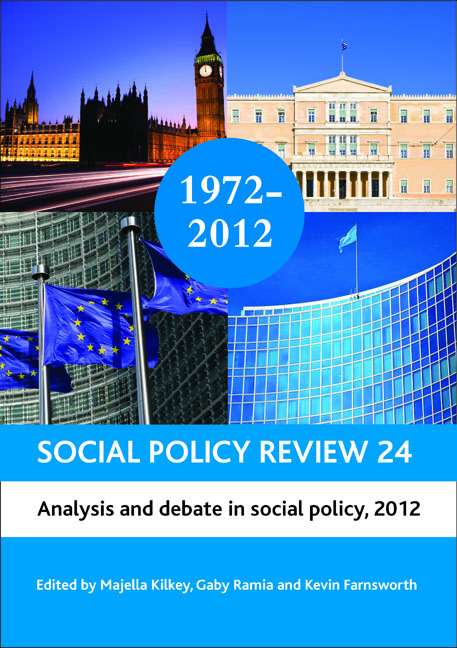seven - Welfare retrenchment under Left and Right government leadership: towards a consolidated framework of analysis?
Published online by Cambridge University Press: 07 September 2022
Summary
Introduction
Over the course of the last two decades, comparative welfare research has dealt with two puzzles. Initially, it was commonplace that Western European welfare states remained remarkably ‘resilient’ despite major fiscal and socio-economic pressures, globalisation, and frontal assaults by austerity governments (see, eg, Castles, 2004). To explain this first puzzle, the ‘new politics’ of the welfare state became synonymous with the politics of ‘blame avoidance’ (Green-Pedersen and Haverland, 2002; Starke, 2006): the persistent popularity of welfare programmes was said to trigger coalitions of welfare defenders, making downward adjustments of post-war welfare settlements, that is, welfare retrenchment, electorally highly risky for office-seeking policymakers (Pierson, 1994, 1996, 2001b). In addition, path dependency theory pointed towards ‘lock-in’ and ‘feedback effects’ of past policy decisions (Weaver, 1986; Pierson, 2000; Swank, 2001) while defenders of the welfare state made use of constitutional constraints to hinder welfare retrenchment (Swank, 2001; Kuhner, 2010). The ‘new politics’ thesis views ‘retrenchment politics [as] a distinctive enterprise’ from the politics of welfare expansion – not least because it argues that ‘the centrality of left party and union confederation strength to welfare outcomes has declined’ (Pierson, 1996, p 151, cited in Scarbrough, 2000). More recently, however, numerous Western European governments were identified as having engaged in welfare retrenchment during the three decades since the 1970s’ oil and stagflation crises (Ferrera and Rhodes, 2000; Scharpf and Schmidt, 2000; Palier, 2010). What is more, rather than losing their ‘centrality’, several scholars have argued that Left parties played a critical role in the politics of welfare retrenchment across Western Europe. Contrary to mainstream partisan theory, which has traditionally viewed Left parties as representatives of blue-collar interests (Hibbs, 1977; Castles, 1982; Shalev, 1983; Korpi, 1989; Hicks and Swank, 1992), the capacity of Left parties to facilitate or even spearhead welfare retrenchment has been emphasised (Levy, 1999; Ross, 2000; Armingeon et al, 2001). Simultaneously, it was pointed out that trade unions continued to assert their influence (Ebbinghaus and Hassel, 2000; Trampusch, 2006, 2007).
As a consequence of these contrasting accounts, comparative welfare research has attempted to answer ‘why’, ‘when’ and ‘how’ policymakers, particularly on the left of the political spectrum, engage in ‘treacherous’ (Pierson, 1994, p 18) welfare state retrenchment.
- Type
- Chapter
- Information
- Social Policy Review 24Analysis and Debate in Social Policy, 2012, pp. 137 - 164Publisher: Bristol University PressPrint publication year: 2012

